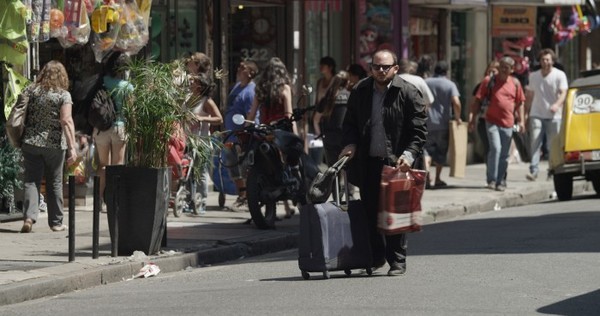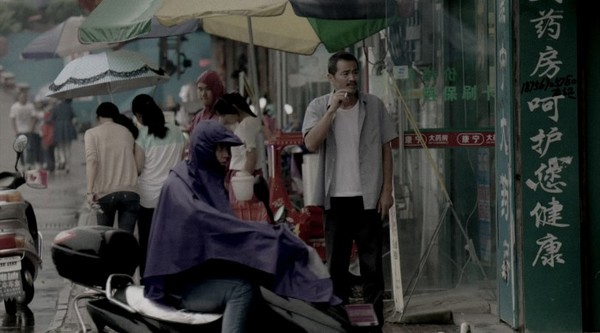COMA
柏林影評週 Berlin Critics’ Week
敘利亞Syria / 黎巴嫩 Lebanon | 2015 | 98min
導演Dir. Sara Fattahi
(圖為柏林影評週活動現場 Photo by Cari)
導演以鏡頭望向自己在大馬士革的母親與祖母。在內戰戰火中,面對家中男人的缺席,她們無助又飽受煎熬。母親質問生活為何一成不變,索然無味。當時間不停流逝,她們到底在等待什麼?這樣的提問讓人不禁想起貝克特的《等待果陀》。這是一部談論失去、恐懼與戰爭的影片。導演透過鏡頭下的人物,拋出了一個深刻觀點:這場戰爭不僅僅是外在的,同時也是內在的,即這場戰爭就在我們心中。電影並未呈現任何可見的暴力,僅透過一顆顆將三個女人的日常緊密框限在一起的鏡頭、不完整的人物影像以及遍地荒塚的城市圖像,便逐層揭開,並傳達出這個社會正日漸瓦解的訊息。作為一個極為私密的個人影像,它並置不同人物的兩難處境與掙扎。這些充滿憂傷的影像是否具有有效性,值得探討。柏林影評週藉由這部影片,意在探討數位圖像是如何在電影裡挑戰權力關係。而最重要的,或許正如本片導演所說,「每一部電影都有它的目標。」
Director Sara Fattahi portrays her mother and grandmother in Damascus, who are helpless and suffer in the civil war with the absence of men. Mother questions why life is bored and always the same. When time is fleeting, they even don’t know what they’re waiting for, which inevitably reminds us of Waiting for Godot by Samuel Beckett. This is a film about loss, fear and war. Through the characters under the camera, a profound standpoint is put forward: the war is both outside and inside, that is to say, the war is actually within us. There is no visible violence in this film, but a sequence of powerful shots that intimately frame the three women together, the incomplete images of figures, as well as the landscape of a city full of tombs, all work to reveal and convey the message of a disintegrating society. As an internal and personal film, it juxtaposes the dilemma and struggle of different persons with sorrow images, the effectivity of which is worth to be examined. With this film, Berlin Critics’ Week also aims to debate how digital imagery challenges power relations within cinema. But what the most important is, perhaps as Sara said, “Every film has agenda.”
El rey del Once(The Tenth Man)第十人(暫譯)
電影大觀特別單元Panorama Special
阿根廷Argentina | 2016 | 80 min
導演Dir. Daniel Burman

( Photo from Berlinale)
這是一部刻劃父子關係的電影。父親Usher成立慈善組織無微不至地關照他人,卻唯獨漏了自己的兒子。兒子Ariel心中始終有一個未解的創傷記憶,即十歲那年,父親基於猶太習俗,為了替陌生猶太人的葬禮湊齊十個人,而沒有出席他擔任旗手的學校升旗。影片中過去與現在的串聯,是透過具有膠捲質感的閃回鏡頭,幼年的Ariel在早餐桌上儀式性地把醬塗在餅乾上,之後再過渡到成年的Ariel。中年Ariel重返幼年生長地─布宜諾斯艾利斯的猶太區Once與父親相見,卻始終不得見。Usher直到影片的最後一刻才現身。有影評便將被人們尊稱為God的Usher與果陀(Godot)再次聯繫起來,畢竟他總是以各種任務推遲與兒子的見面。但,他終究還是出現了。就如導演所自言,在這個故事裡,父親是兒子的問題癥結,同時也是解答,他讓兒子自己去尋找出口。最終,Arie找到了,並透過自己也成為那第十人的行動,從心底接納了猶太的宗教習俗。深言之,在電影中,父親Usher或許亦不過只是一個符號,更重要的是多年以後自外返家的Ariel,對猶太社群的重新認同。整體而論,這個處理父子關係的故事其實並不複雜,當中亦穿插了Ariel和同樣與父親疏離的靜默的Eva的曖昧情愫,讓故事更形豐滿。除了個人認同的議題,影展簡介的一句話或許也能為這部電影再下一道最佳註解:「他們回望過去以形塑現在。」
This is a film that explores the father-son relationship. Father Usher takes good care of others by founding a charity foundation, while he just can’t do the same for his son. There’s always a traumatic memory in Son Ariel’s mind: when ten-year-old Ariel was eager to see his father’s presence in school event since he was the flagbearer, Usher instead went to a stranger’s funeral as the tenth man just for the religious customs of Jewish community. In this film, the connection of the past and the present is established through the flashback of a breakfast scene, when little Ariel spreads jams on biscuits in a ritualistic way, then middle-aged Ariel follows. Middle-aged Ariel returns to Once, the Jewish district of Buenos Aires where Ariel spent his youth, to meet with his father, but fails over and over again. Usher actually comes into our sight at the last moment of the film. Some critics also links Usher, who is respectfully called God, with Godot, since he always delays their meeting by assigning works for Ariel. But eventually he shows up. As the director said, in this story, the father is the problem, but also the solution. He decides to let his son seek the exit by himself. At last, Ariel finds it and by the action of being the tenth man himself, he hugs the Jewish religious customs from the bottom of his heart. Furthermore, while father Usher perhaps is only a sign in this film, the most essential thing is Ariel’s reconnection with his own Jewish community after the return. To conclude, the story that deals with father-son relationship is not complicated and also rich with the romantic plot between Ariel and the silent Eva who also distances herself from her father. Apart from the identity issue, there is also a sentence from the Berlinale introduction that might best comment the protagonists in this film, “They look back at the past in order to shape the present.”
Lao Shi(Old Stone)老石
論壇Forum
中國People's Republic of China / 加拿大Canada | 2016 | 80 min
導演Dir. 馬楠Johnny Ma

( Photo from Berlinale)
出生加拿大,在美國習影的導演如何詮釋當代中國,或許是這部電影首先最引人好奇的地方。故事背景設在製片的家鄉安徽廣德,影片圍繞「救與不救」的核心選擇,步步緊追「老實」的計程車司機老石如何走上絕路。「老石」一方面意指老石在墊付醫藥費這件事上出於善心的傳統與固執,在另一個側面,也折射出社會中自私者(如事不關己的旁觀者、不願作證的乘客)的鐵石心腸與體制結構(如堅稱老石違反程序的警察與保險公司)的僵化。電影片尾音樂與侯孝賢的《刺客聶隱娘》同,導演說這是想運用大膽音調而加入的獨立創作。同一首樂曲,放在兩部電影裡,卻是截然不同的氣味。如果說《刺客聶隱娘》烘托的是大時代的寧靜浩遠,那麼《老石》吶喊的則是絕望的當代城鎮寓言。影片「小題大作」,從小事件出發層層堆砌,是不錯的起始點。然而隨著情節推展,卻也逐漸暴露出一些問題。例如選擇站在老石對立面,本是老石在親情線上最深刻的牽絆的妻子,在故事後段近乎全然缺席,直到最後一幕才如幻影般再出場。除此之外,電影的故事走向也逐漸超展開,以致最後甚至有種超寫實,甚至恐怖電影的味道。這樣的結果是,若要論社會寫實,總覺得不夠力道;若要說類型流動的突破創新,卻也總還能在這部電影裡看到其他電影的影子,例如片頭幾度出現的樹林意象,便讓人直覺想起李安的《臥虎藏龍》與柯波拉的《現代啟示錄》。但無論如何,影片對於中國城鎮問題的正視與挖掘,仍值得肯定。
Glowing up in Canada and learning film in US, how director Johnny Ma will interpret contemporary China might be the most interesting question firstly. Set in Guangde, Anhui Province, where is the hometown of the producer, Lao Shi centers the core choice of “to save or not,” chasing the “honest” (also pronounces “Lao Shi” in Chinese) taxi driver Lao Shi to the dead end. The name “Lao Shi,” which means old stone, on the one hand refers to Lao Shi’s traditional, stubborn but also kind decision to pay for the victims; on the other hand, it also mirrors the selfish people in the society (E.g. the indifferent bystanders and the irresponsible passenger who refuses to give testimony) as well as the rigid institutional structure (E.g. the police and insurance company who insist Lao Shi’s violation of the legal procedure). The music in the end is the same as that in Hou Hsiao-Hsien’s The Assassin. Director Johnny Ma said it was an independent work with his desire for bold note. Although the music is the same, the atmosphere is completely different in the context of these two films. If The Assassin arouses a sense of peace and vastness in history, Lao Shi then cries out a hopeless contemporary urban (or town) tale. This film starts with a single issue, which will be a good point. However, when the story goes further, there’re more problems exposed. For instance, Lao Shi’s wife, the one who stands at the opposite side of him and plays an essential role in the family line, is nearly absent in the second half section of the story, until her presence in the end like a phantom. Apart from it, the story is a little over expanded with too many surrealistic or even horror film elements added in the end. The outcome is, when the perception of social reality is concerned, the film is not strong enough. When talking about the creativity and flow of genres, this film still goes under the shadow of other masterpieces. For example, the frequent imagery of woods at the beginning directly reminds me of Ang Lee’s Crouching Tiger, Hidden Dragon and Coppola’s Apocalypse Now. Nevertheless, the film is still a sincere attempt to face and explore the urban (or town) problem in contemporary China.




